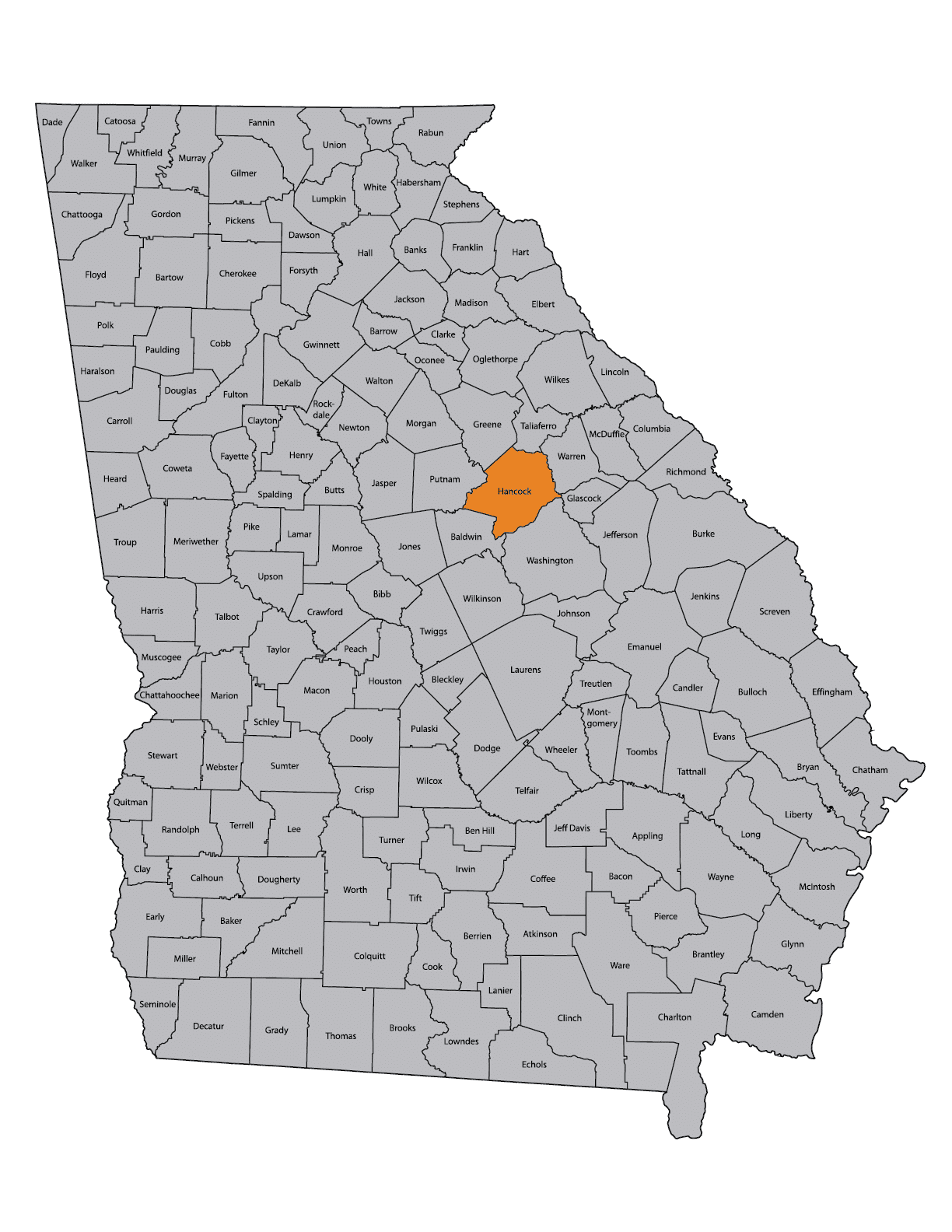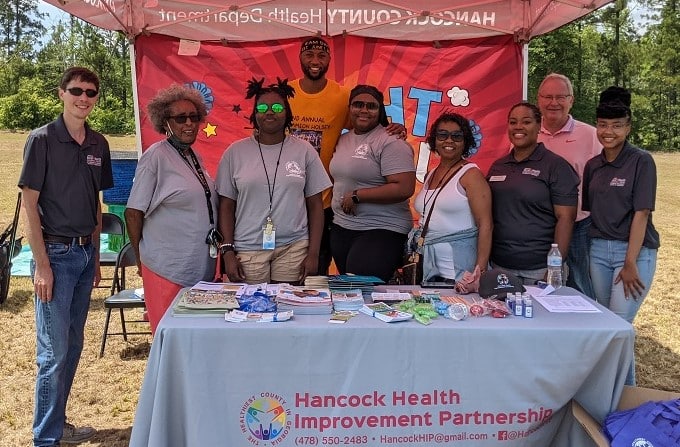 The Center awarded grant sub-contract with the Georgia Department of Public Health
The Center awarded grant sub-contract with the Georgia Department of Public Health
The North Central Health District (NCHD) of the Georgia Department of Public Health announced a request for proposal (RFP) to conduct a needs assessment around COVID-19/flu vaccine hesitancy in the African-American population in Hancock County, Georgia. The needs assessment will inform NCHD’s ongoing implementation of community-focused COVID-19 and flu vaccination promotional activities aiming to increase vaccine awareness, access, and confidence among racial and ethnic minority groups experiencing disparities in vaccine coverage. Additionally, the needs assessment component is a part of a larger grant program, Racial and Ethnic Approaches to Community Health (REACH), funded by the Centers for Disease Control and Prevention (CDC).
Hancock County, which has the highest percentage of African-Americans in Georgia, has seen significant challenges during the COVID-19 pandemic. Prior to the pandemic, many concerns such as the high poverty rates, low educational attainment, decreasing population, and poor health outcomes created a challenging environment. Historically in the United States, health disparities, particularly burden of disease, have been disproportionate among communities of color, especially in Black or African- American populations when compared to White and other racial and ethnic minority populations. Stemming from the 1985 Report of the Secretary’s Task Force on Black & Minority Health which first documented this disproportion among Blacks termed as “excess deaths” to the highest flu-related hospitalization rates (68 per 100,000) from the 2009- 2019 flu seasons per the CDC, and now to the current COVID-19 pandemic in which Blacks continue to have the highest COVID-19 mortality rates in the United States and Georgia, further highlights the plight of the African American health experience. According to USA Today, at one point, Hancock County, had the highest COVID-19 mortality rates in the United States.
In being aware of the population health dilemma present in Hancock County, the Georgia Rural Health Innovation Center (“the Center”), in collaboration with the Mercer University School of Medicine, Department of Community Medicine, submitted a competitive proposal to NCHD and was subsequently awarded the grant sub-contract (award year May 2021-August 2022). Dr. Kimberly Carr, community resource specialist at the Center, is leading the project with the support of project team members Chris Scoggins, Director of Special Projects, Dr. Anne Montgomery, Biostatistician, and Dr. Brad Lian, Mercer University School of Medicine, Department of Community Medicine. One of the strengths of the selected proposal was the Center’s approach to conducting the needs assessment which underlined the importance of the historical and cultural context of Hancock County as it relates to the African- American rural health and healthcare experience. The Center’s innovative approach uses several narrative lenses: narrative ethics, intersectionality, and health equity that will help provide insight on the lived and everyday experiences of the African- American rural health experience and how these experiences influence attitudes and beliefs toward COVID-19 and flu vaccine hesitancy. Another highlight of the proposal is that the information revealed from this assessment will prove useful in future efforts to increase seasonal influenza vaccination rates and other vaccination rates of interest such as HPV and shingles.
This needs assessment addresses two of the Center’s Grand Challenges: social determinants of health and aging populations.
Submitted by Dr. Kimberly Carr

Preliminary findings of the Phase 1 Initial Needs Assessment were presented to the North Central Health District of the Georgia Department of Public Health (NCHD-DPH) on July 28, 2021 in Sparta, Georgia. Phase 1 occurred between May 5, 2021 and July 31, 2021. The purpose of the initial assessment is to better understand the attitudes, motivations and beliefs of vaccine hesitancy among African Americans living in Hancock County, Georgia. The initial needs assessment will also inform NCHD-DPH’s ongoing COVID-19 and flu vaccine efforts.
A total of 124 COVID-19 and flu community surveys were collected. Also, three focus groups and five key informant interviews were conducted. Key informant interviews and focus groups were representative of different segments of the community: education, faith-based, healthcare, and local government. Qualitative methods like key informant interviews and focus groups allowed for a more in-depth, rich, and robust analysis to help identify barriers and drivers of vaccine access, keys to successful vaccine behaviors, vaccine hesitancy and the community impact of COVID-19 and flu. Additionally, attending community events such as Kam Kares and the Arts in Sparta Festival, provided opportunities for the project team to understand the community’s sociocultural context, one of the key factors in building community ties and gaining insight to vaccine hesitancy behaviors.
Emergent themes from findings included misinformation in the form of conspiracy theories and inconsistent vaccine messaging. These common themes were notable drivers of vaccine hesitancy. On a larger scale, vaccine complacency, vaccine inconvenience, and lack of vaccine confidence also played a role and could be observed throughout the data. Prominent sources of untrusted vaccine information included social media, internet searches, and word of mouth. Trusted vaccine information included the health department, physicians, the Centers for Disease Control and Prevention, and science. Faith leaders and healthcare workers were the most trusted messengers within the community.
The next sub-phase of the initial needs assessment: Audience Testing (of COVID-19 and flu vaccine messages) has begun and will continue through September 30, 2021.
Currently, the COVID-19 and Flu Vaccine Hesitancy Needs Assessment in Hancock County, Georgia is in the “audience testing“ phase of COVID-19 and flu vaccine messaging. Audience testing is typically implemented when there is a need to gain more insight on a particularly activity in hopes of becoming more knowledgeable about the activity and receiving feedback from the intended, targeted “audience” which in this case are residents of Hancock County. Preliminary findings from the initial needs assessment found that one of the primary COVID-19 and flu vaccine messages in decreasing vaccine hesitancy among Hancock County residents is to “Protect Your Loved Ones”. Promotion of COVID-19 and flu vaccination messages will be in this context. Hancock County residents are being actively recruited to participate in focus groups and/or being a key informant in discussing the COVID-19 and flu vaccine messages they would like to see in their communities. The Georgia Rural Health Innovation Center is helping to support Hancock County in being the “healthiest county in Georgia”, a mission established by the Hancock Health Improvement Partnership (HHIP) and further supported by the Georgia Department of Public Health, North Central Health District.



